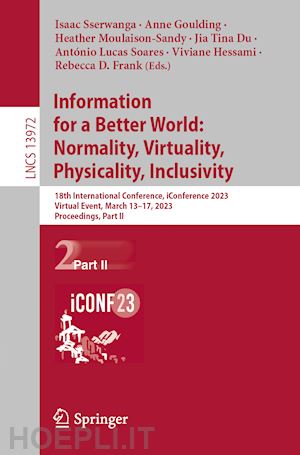
Questo prodotto usufruisce delle SPEDIZIONI GRATIS
selezionando l'opzione Corriere Veloce in fase di ordine.
Pagabile anche con Carta della cultura giovani e del merito, 18App Bonus Cultura e Carta del Docente
The 36 full papers and the 46 short papers presented in these proceedings were carefully reviewed and selected from 197 submissions. They cover topics such as: Archives and Records, Behavioral Research, Information Governance and Ethics, AI and Machine Learning, Data Science, Information and Digital literacy, Cultural Perspectives, Knowledge Management and Intellectual Capital, Social Media and Digital Networks, Libraries, Human-Computer Interaction and Technology, Information Retrieval, Community Informatics, and Digital Information Infrastructure.
Knowledge Management and Intellectual Capital.- Enabling Knowledge Management Practices in Museums: Benefits of and Barriers to Achieving Public Value.- How Much Context Do Users Provide in App Reviews? Implications for Requirements Elicitation.- Evaluating Tools for Data Management Plans: A Comparative Study of the DART Rubric and the Belmont Scorecard.- Topic Evolution Analysis Based on Optimized Combined Topic Model: Illustrated as CRISPR Technology.- “Design, Design, and Design Again”: An Information-Architecture Redesign Workflow from Case Studies of a Government Portal and a Learning-management System.- What Does Provenance LACK: How Retrospective and Prospective Met the Subjunctive.- Exploration of Accuracy, Completeness and Consistency in Metadata for Physical Objects in Museum Collections.- Social Media and Digital Networks.- How We Express Ourselves Freely: Censorship, Self-censorship, and Anti-censorship on a Chinese Social Media.- Impact of Social Media on Self-Esteem and Emotions: An Instagram-based Case Study.- Motivations, Purposes, and Means of Creating Information Cocoons Intentionally for Oneself: Looking on the Bright Side.- Left and Right Retweets! Curation Logics During Black History Month.- Libraries.- Another Named Storm! Building Resiliency Through Florida’s Essential Public Libraries.- Digital Experiences in Physical Spaces: Virtual Reality and Public Libraries in Aotearoa New Zealand.- What Do We Do with the Fruits of Open Educational Practices? A Case for Open Educational Collections.- Terminology Preferences of the LGBTQ+ Community: A User Study.- Exploring the Concept of Library Use: A Research Review.- Shared LGBTQ+ Identity in Librarian-Community Partnerships.- Bridging the Gap between Research and Practice in Library Science through Library Society of China: A Pilot Study.- Automation of University Library Operations: An Analysis of the Covid-19 Pandemic Experience in the United Kingdom and Nigeria.- Human-Computer Interaction and Technology.- What Makes a Technology Privacy Enhancing? Laypersons' and Experts' Descriptions, Uses, and Perceptions of Privacy Enhancing Technologies.- A Critique of Using Contextual Integrity to (Re)consider Privacy in HCI.- Audience Video Game Engagement in a Live Streaming Context: Examining the Role of Perceived Influence of Game Streamers from the Self-determination Perspective.- A Surprise Birthday Party in VR: Leveraging Social Virtual Reality to Maintain Existing Close Ties Over Distance.- “Monday Feels Like Friday!” - Towards Overcoming Anxiety and Stress of Autistic Young Adults during Times of Isolation.-Self-Tracking to Manage Chronic Illness: Exploring User Agency in Apps for Diabetes Self-Management.- Autism and Virtual Reality Interventions: Research Trends and Practices.- Towards a Useful Chinese Annotation Tool: An Examination of Annotators’ Practice and Needs.- Information Retrieval.- Similarity Visualizer using Natural Language Processing in Academic Documents of the DSpace in Ecuador.- Information Retrieval Research in Academia and Industry: A Preliminary Analysis of Productivity, Authorship, Impact, and Topic Distribution.- Career-Based Explainable Course Recommendation.- A Benchmark of PDF Information Extraction Tools Using a Multi-Task and Multi-Domain Evaluation Framework for Academic Documents.- Contextualizing Session Resuming Reasons with Tasks Involving Expected Cross-session Searches.- Community Informatics. -Time Lag Analysis ofAdding Scholarly References to English Wikipedia: How Rapidly are They Added to and How Fresh are They.- Examining Interest in Open Government Data Through Digital Traces.- “Trapped” by Recommendation Algorithms? A Mixed Methods Study on the Use of Content Recommendation System in Everyday Life in Western China.- Community Design of a Knowledge Graph to Support Interdisciplinary Ph.D. Students.- Potential of Participatory Geographic Information System to Build Environmental Information Ecosystem and Claim Environmental Justice: A Research Agenda for Fisherfolk Community in Bangladesh.- Caring for People, Caring for Their Data: Data Stewardship and Collaborative Care in Social Service Provision for People Experiencing Homelessness.- Is there a Scientific Digital Divide? Information Seeking in the International Context of Astronomy Research.- Digital Information Infrastructures.- TheConceptualization of Digital Inclusion in Government Policy: A Qualitative Content Analysis.- Dublin Core Metadata Created by Kuwaiti Students: Exploration of Quality in Context.- Trustworthy Digital Repository Certification: A Longitudinal Study.- Design Principles for Background Knowledge to Enhance Learning in Citizen Science.- ``We Avoid PDFs'': Improving Notation Access for Blind and Visually Impaired Musicians.- The Rural Informatization Policies in China: The Power Dynamics and Policy Instruments.











Il sito utilizza cookie ed altri strumenti di tracciamento che raccolgono informazioni dal dispositivo dell’utente. Oltre ai cookie tecnici ed analitici aggregati, strettamente necessari per il funzionamento di questo sito web, previo consenso dell’utente possono essere installati cookie di profilazione e marketing e cookie dei social media. Cliccando su “Accetto tutti i cookie” saranno attivate tutte le categorie di cookie. Per accettare solo deterninate categorie di cookie, cliccare invece su “Impostazioni cookie”. Chiudendo il banner o continuando a navigare saranno installati solo cookie tecnici. Per maggiori dettagli, consultare la Cookie Policy.